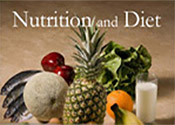 The Word of Wisdom contains the Lord’s outline of the kinds of food that provide good nutrition.
The Word of Wisdom contains the Lord’s outline of the kinds of food that provide good nutrition.
Balanced nutrition includes drinking plenty of clean water and regularly eating foods from each of six food groups: grains, vegetables, fruits, milk products, meat and beans, and oils. These foods contain six kinds of nutrients: proteins, carbohydrates, fats, minerals, vitamins, and water. A person should regularly eat or drink enough of all of these nutrients to grow and remain healthy. (See Nutrition Calculations.) For infant nutrition, mother’s milk itself provides an ideal balance of nutrients, with the gradual introduction of solid foods after four to six months of age.
If a variety from all food groups is eaten regularly, it is not usually necessary to take supplements. Even carefully chosen vegetarian diets that include dairy products or eggs can be quite sufficient. But if little or no animal products are eaten, then grains must be eaten with legumes (beans, peas, peanuts, and lentils), nuts, and seeds to provide balanced protein.
Food and drink must also be clean and free from disease-causing germs (bacteria, viruses, and parasites) to be healthy. Purified water (potable water) is prepared by removing dirt from the water and treating the water to remove or kill germs. In some areas, the government purifies water that is delivered through secured plumbing; this water is safe to use directly from the faucet for food and drink. In most of the world, however, water should be purified before use. Foods should be washed free of dirt and then peeled, cooked, boiled, or sanitized before eating.
Food must be eaten in proper amounts to maintain good health. Eating disorders are serious, negative eating behaviors that can be fatal if untreated. Generally, obesity results from eating more, while malnutrition results from eating less food than needed for growth, maintenance, and daily activity. Daily energy needs can be estimated based on age, height, weight, and level of activity. The body mass index (BMI) can be a useful measure of the degree of under-nutrition or over-nutrition.
Related Content
From Church Magazines
- “Cancer, Nutrition, and the Word of Wisdom: One Doctor's Observations,” Ensign, July 2008, 42
- “Take Care,” New Era, July 2007, 34
- “My Obsession with Food,” Ensign, October 2002, 57
- “Idea List: A Healthier You,” New Era, November 2006, 23
- “Six Tips for Spotting a Fad Diet,” Ensign, September 2006, 72-73
